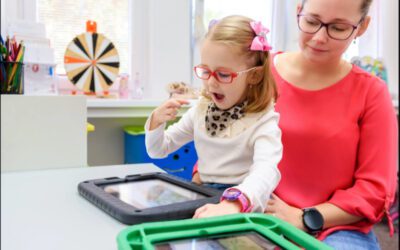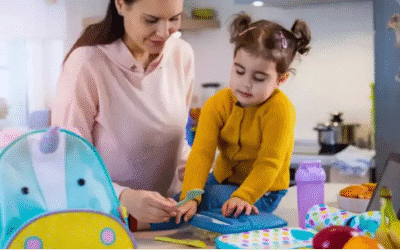Speech Sounds in Kids: What’s Typical and When to Get Help
Not sure if your child’s unclear speech is typical or a sign they need support? This article explains what speech sounds to expect at each age and when to seek help from a speech pathologist.
Encouraging First Words: Responsive Strategies for Parents
Supporting your child’s first words doesn’t need to be stressful. Learn practical, pressure-free strategies to encourage communication through play, daily routines, and everyday interactions.
Why Speech Therapy Looks Like Play (and Why That’s Powerful)
Speech therapy often looks like play, but every game, toy, and laugh has a purpose. Learn how play helps children build real communication skills in meaningful, lasting ways.
Building Language Skills at Home Without Worksheets
Helping your child develop language skills doesn’t need worksheets. Learn how everyday routines, play, and conversation can boost vocabulary, sentence skills, and confidence at home.
Understanding AAC: A Tool for Communication and Connection
AAC opens up new ways for people to share their thoughts, feelings, and ideas – helping everyone communicate, connect, and build stronger relationships.
Supporting Social Skills: Practical, Affirming Strategies
Learn practical ways to support children’s social skills in everyday life. These affirming strategies help kids feel confident, understood, and socially capable.
Screen Time and Speech Development: What the Research Really Says
Screens are part of everyday life, but too much screen time can reduce the words and conversations your child experiences each day. Learn simple, practical tips to support speech and language development while still enjoying devices in moderation.
Unlock Your Child’s Potential with Leading Speech Pathology NDIS in Gymea
Our team provides personalized speech pathology NDIS Gymea services to help children overcome communication challenges. From improving literacy skills to fostering school readiness, we focus on empowering children to communicate confidently and thrive in every aspect of life.
What Speech Therapy Looks Like for a Gestalt Language Processor
Speech therapy isn’t one-size-fits-all. For gestalt language processors – children who learn language in chunks or scripts – therapy looks and sounds very different. This natural approach to language development values echolalia, scripts, and meaningful phrases as important steps toward communication.
Turn Daily Routines into Language Opportunities
Language development doesn’t just happen during story time or structured lessons – it happens everywhere. In fact, some of the richest language-building moments take place during your everyday routines. Whether you’re baking cookies, wrapping a gift, or grocery shopping, each of these moments is filled with opportunities to model language, build vocabulary, and support your child’s communication skills in a natural, meaningful way.
Speech Therapy NDIS in Caringbah for Lifelong Communication Skills
Discover how speech therapy NDIS in Caringbah supports individuals in improving communication and social skills through personalised treatment plans.
Encouraging Independence & Social Skills at Mealtimes
Lunchtime at school is more than just a break for food – it’s a vital opportunity for children to build independence, communication skills, and social confidence. While packing the perfect lunch is often top-of-mind for parents, equally important is helping children learn to manage their meals on their own, ask for help when needed, and engage socially with their peers.











